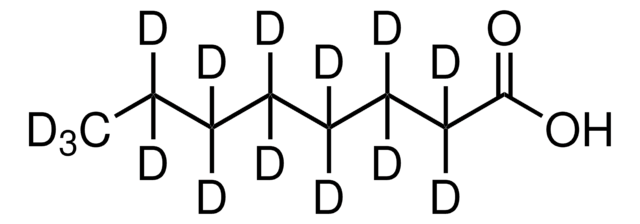489131
Dodecane-d26
98 atom % D
About This Item
Produits recommandés
Pureté isotopique
98 atom % D
Niveau de qualité
Pureté
99% (CP)
Indice de réfraction
n20/D 1.422 (lit.)
Point d'ébullition
215-217 °C (lit.)
Pf
−9.6 °C (lit.)
Densité
0.864 g/mL at 25 °C
Changement de masse
M+26
Chaîne SMILES
[2H]C([2H])([2H])C([2H])([2H])C([2H])([2H])C([2H])([2H])C([2H])([2H])C([2H])([2H])C([2H])([2H])C([2H])([2H])C([2H])([2H])C([2H])([2H])C([2H])([2H])C([2H])([2H])[2H]
InChI
1S/C12H26/c1-3-5-7-9-11-12-10-8-6-4-2/h3-12H2,1-2H3/i1D3,2D3,3D2,4D2,5D2,6D2,7D2,8D2,9D2,10D2,11D2,12D2
Clé InChI
SNRUBQQJIBEYMU-DWXHPOBZSA-N
Catégories apparentées
Conditionnement
Code de la classe de stockage
10 - Combustible liquids
Classe de danger pour l'eau (WGK)
WGK 3
Point d'éclair (°F)
159.8 °F - closed cup
Point d'éclair (°C)
71 °C - closed cup
Faites votre choix parmi les versions les plus récentes :
Déjà en possession de ce produit ?
Retrouvez la documentation relative aux produits que vous avez récemment achetés dans la Bibliothèque de documents.
Les clients ont également consulté
Notre équipe de scientifiques dispose d'une expérience dans tous les secteurs de la recherche, notamment en sciences de la vie, science des matériaux, synthèse chimique, chromatographie, analyse et dans de nombreux autres domaines..
Contacter notre Service technique













